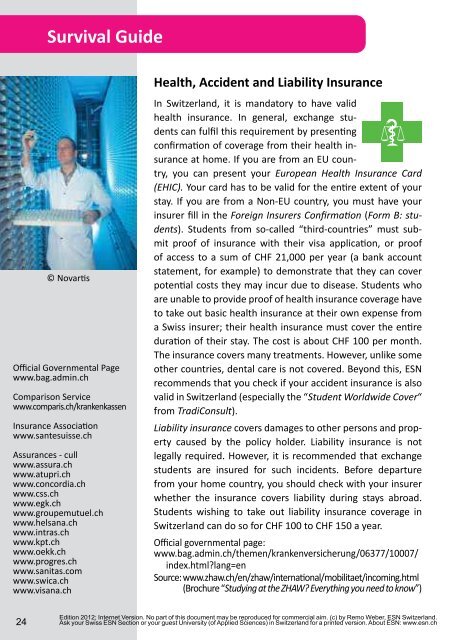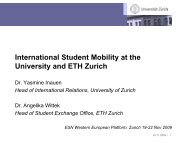A Guide for Exchange Students in Switzerland - Berner ...
A Guide for Exchange Students in Switzerland - Berner ...
A Guide for Exchange Students in Switzerland - Berner ...
Create successful ePaper yourself
Turn your PDF publications into a flip-book with our unique Google optimized e-Paper software.
24<br />
Survival <strong>Guide</strong><br />
© Novarti s<br />
Offi cial Governmental Page<br />
www.bag.adm<strong>in</strong>.ch<br />
Comparison Service<br />
www.comparis.ch/krankenkassen<br />
Insurance Associati on<br />
www.santesuisse.ch<br />
Assurances - cull<br />
www.assura.ch<br />
www.atupri.ch<br />
www.concordia.ch<br />
www.css.ch<br />
www.egk.ch<br />
www.groupemutuel.ch<br />
www.helsana.ch<br />
www.<strong>in</strong>tras.ch<br />
www.kpt.ch<br />
www.oekk.ch<br />
www.progres.ch<br />
www.sanitas.com<br />
www.swica.ch<br />
www.visana.ch<br />
Health, Accident and Liability Insurance<br />
In <strong>Switzerland</strong>, it is mandatory to have valid<br />
health <strong>in</strong>surance. In general, exchange students<br />
can fulfi l this requirement by presenti ng<br />
confi rmati on of coverage from their health <strong>in</strong>surance<br />
at home. If you are from an EU country,<br />
you can present your European Health Insurance Card<br />
(EHIC). Your card has to be valid <strong>for</strong> the enti re extent of your<br />
stay. If you are from a Non-EU country, you must have your<br />
<strong>in</strong>surer fi ll <strong>in</strong> the Foreign Insurers Confi rmati on (Form B: students).<br />
<strong>Students</strong> from so-called “third-countries” must submit<br />
proof of <strong>in</strong>surance with their visa applicati on, or proof<br />
of access to a sum of CHF 21,000 per year (a bank account<br />
statement, <strong>for</strong> example) to demonstrate that they can cover<br />
potenti al costs they may <strong>in</strong>cur due to disease. <strong>Students</strong> who<br />
are unable to provide proof of health <strong>in</strong>surance coverage have<br />
to take out basic health <strong>in</strong>surance at their own expense from<br />
a Swiss <strong>in</strong>surer; their health <strong>in</strong>surance must cover the enti re<br />
durati on of their stay. The cost is about CHF 100 per month.<br />
The <strong>in</strong>surance covers many treatments. However, unlike some<br />
other countries, dental care is not covered. Beyond this, ESN<br />
recommends that you check if your accident <strong>in</strong>surance is also<br />
valid <strong>in</strong> <strong>Switzerland</strong> (especially the “Student Worldwide Cover“<br />
from TradiConsult).<br />
Liability <strong>in</strong>surance covers damages to other persons and property<br />
caused by the policy holder. Liability <strong>in</strong>surance is not<br />
legally required. However, it is recommended that exchange<br />
students are <strong>in</strong>sured <strong>for</strong> such <strong>in</strong>cidents. Be<strong>for</strong>e departure<br />
from your home country, you should check with your <strong>in</strong>surer<br />
whether the <strong>in</strong>surance covers liability dur<strong>in</strong>g stays abroad.<br />
<strong>Students</strong> wish<strong>in</strong>g to take out liability <strong>in</strong>surance coverage <strong>in</strong><br />
<strong>Switzerland</strong> can do so <strong>for</strong> CHF 100 to CHF 150 a year.<br />
Offi cial governmental page:<br />
www.bag.adm<strong>in</strong>.ch/themen/krankenversicherung/06377/10007/<br />
<strong>in</strong>dex.html?lang=en<br />
Source: www.zhaw.ch/en/zhaw/<strong>in</strong>ternati onal/mobilitaet/<strong>in</strong>com<strong>in</strong>g.html<br />
(Brochure “Study<strong>in</strong>g at the ZHAW? Everyth<strong>in</strong>g you need to know”)<br />
Edition 2012; Internet Version. No part of this document may be reproduced <strong>for</strong> commercial aim. (c) by Remo Weber, ESN <strong>Switzerland</strong>.<br />
Ask your Swiss ESN Section or your guest University (of Applied Sciences) <strong>in</strong> <strong>Switzerland</strong> <strong>for</strong> a pr<strong>in</strong>ted version. About ESN: www.esn.ch<br />
F<strong>in</strong>ancial Matt ers<br />
Currency<br />
<strong>Switzerland</strong>’s currency is the Swiss franc. The smaller denom<strong>in</strong>ati<br />
on, which is worth a hundredth of a franc, is called “Rappen”<br />
(German), “Centi me” (French) or “Centesimo” (Italian). It has<br />
been a very stable currency dur<strong>in</strong>g ti mes of (fi nancial) crisis<br />
and is there<strong>for</strong>e called “safe haven”. As the <strong>in</strong>fl ati on always has<br />
been low, you sti ll fi nd co<strong>in</strong>s from the early 20 th century <strong>in</strong> circulati<br />
on. To guarantee the protecti on aga<strong>in</strong>st <strong>for</strong>gery the bank<br />
notes have been replaced several ti mes. In 2012 it is planned by<br />
the Swiss Nati onal Bank (SNB) to issue new CHF 50 bank notes.<br />
There<strong>for</strong>e the CHF 50 notes you get might look diff erent than<br />
the presented one on the right side.<br />
Banks<br />
There are several opti ons to open a bank account. You can<br />
choose between the two big leaders UBS and CS and the<br />
many smaller banks, like Cantonal Banks, Migrosbank, Bank<br />
Coop, Raiff aisenbank and many more. Another possibility<br />
is Postf <strong>in</strong>ance of the Swiss Post. For exchange students,<br />
Postf <strong>in</strong>ance is the easiest way to get a post account, because<br />
you do not need a domicile confi rmati on as with normal bank<br />
accounts. On the other hand, banks oft en off er special student<br />
conditi ons (like credit card <strong>for</strong> free or a bonus program).<br />
Banks usually are open from 9 am to 5 pm on work<strong>in</strong>g days,<br />
closed on Saturdays, Sundays, and Festi vals. Automati c teller<br />
mach<strong>in</strong>es (ATMs) can be found almost everywhere.<br />
Payment<br />
Next to cash, EC and credit cards (VISA / MASTER) are widely accepted.<br />
Bills usually have to be paid with<strong>in</strong> 30 days. Aft erwards<br />
you oft en have to pay a 5% p.a. penalty. In <strong>Switzerland</strong> it is<br />
common to pay the bill by go<strong>in</strong>g to the post offi ce and show<strong>in</strong>g<br />
the payment slip you received. You have to calculate the total<br />
amount <strong>in</strong> advance; normally you are asked <strong>for</strong> it. Of course it<br />
is also possible to pay the bills via e-bank<strong>in</strong>g. You just have to<br />
copy the payment slip <strong>in</strong><strong>for</strong>mati on <strong>in</strong>to the electronic <strong>for</strong>m.<br />
Survival <strong>Guide</strong><br />
Swiss Nati onal Bank<br />
www.snb.ch<br />
Banks - cull<br />
www.bankcoop.ch<br />
www.credit-suisse.ch<br />
www.kantonalbank.ch<br />
www.migrosbank.ch<br />
www.postf <strong>in</strong>ance.ch<br />
www.raiff eisen.ch<br />
www.ubs.ch<br />
Payment<br />
www.post.ch<br />
Edition 2012; Internet Version. No part of this document may be reproduced <strong>for</strong> commercial aim. (c) by Remo Weber, ESN <strong>Switzerland</strong>.<br />
Ask your Swiss ESN Section or your guest University (of Applied Sciences) <strong>in</strong> <strong>Switzerland</strong> <strong>for</strong> a pr<strong>in</strong>ted version. About ESN: www.esn.ch 25<br />
25



